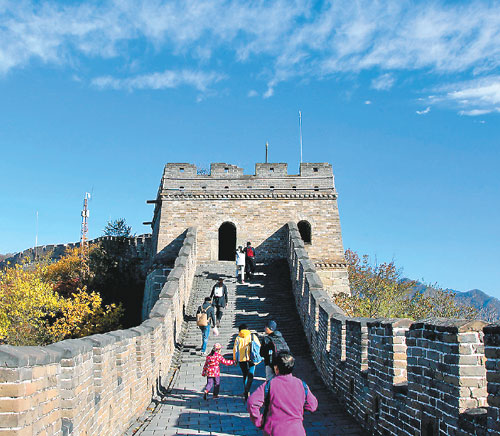Air pollution control brings more blue skies
Beijing made steady improvements in air pollution control in the first four months of the year, greatly reducing emissions of pollutants and increasing blue-sky days, according to the municipal environmental watchdog.
More tough restrictions will be introduced to further cut emissions from industries and other major sources, said Fang Li, deputy director of the Beijing Environmental Protection Bureau.
On Tuesday, the largest coal-burning boiler was removed from the Fengtai district in the downtown area. It had been in operation for more than 30 years.
In the first four months of this year, the capital's PM2.5 levels fell by 17.7 percent year-on-year.
PM2.5 refers to air particles of 2.5 micrometers or less in diameter that can penetrate the lungs and harm health.
Other major airborne pollutants fell significantly, with sulfur dioxide concentration dropping by 43.1 percent from a year earlier, according to the bureau.
Beijing residents have had notably better air to breathe. On 57 days, the air quality exceeded the national standard - eight days more than the previous year, Fang added.
Cooperation among Beijing, Tianjin and Hebei province has been a major factor in the improved air quality. In addition, better weather conditions in the capital helped disperse pollutants, said Li Xiang, deputy head of atmospheric environment management at the bureau.
"More important, stricter pollutant emission controls have continued to work and were a major factor in the more frequent clear skies," she said.
Beijing closed two coal-fired power plants in March, reducing annual coal consumption by 4.6 million tons, the bureau said.
In the first four months of the year, the city phased out more than 110,000 old vehicles that generated excessive exhaust emissions, attaining 55 percent of the annual goal.
Coal burning and vehicle exhaust generate 53 percent of PM2.5, the bureau's research found.
The Beijing municipal government will continue to improve pollution control to reach its goals.
This year, the concentration of PM2.5 and sulfur dioxide will be reduced by 5 percent year-on-year, 300 polluting companies will be shut down and 200,000 old vehicles phased out.
Zhang Wangcai, deputy director of the Beijing Development and Reform Commission's Energy Bureau, said it was determined to push forward with more restrictions on coal consumption as a major way to further reduce emissions.
The capital's four remaining coal-fired thermal power plants will be replaced by clean-energy plants using gas, which will be the standard by 2017 as planned, he said, adding that two gas-fired thermal power plants have been operating since October.
"By the end of this year, we will reduce coal consumption by 8 million tons," Zhang said, adding that a reduction of 7.1 million tons has already been achieved.
Contact the writers at [email protected] and [email protected]
|
Visitors enjoy fresh air on a mainly blue-sky day during a trip to the Great Wall at Mutianyu outside Beijing in October. Pu Xiangdong / Xinhua |
(China Daily 06/05/2015 page7)















